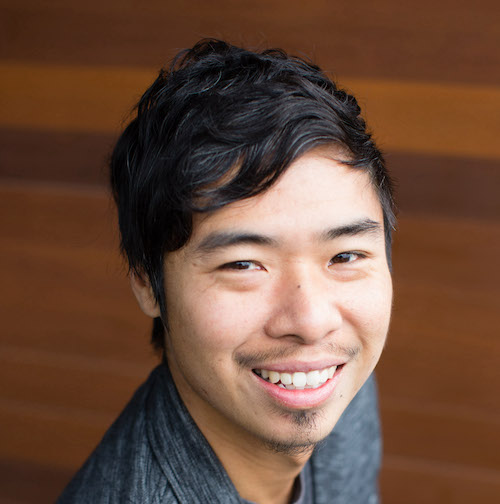Object Permanence
by James Yu
Edited by Pablo Defendini
Copyedited by Chelle Parker
December 2020
3747 words — Reading time: around 18 minutes
Zain started tweeting as the lighthouse on a lark. The federal board certainly didn’t order him. Even the coast guard had stopped maintaining Oren Lighthouse: it never made the Massachusetts tourist lists, always overshadowed by must-see lights like Chatham, Nauset, and Long Point. He knew it wouldn’t be long before the board would recommend demolishing the structure. A dark lighthouse with no tourists had no value.
Tweeting gave the light a voice. He hoped it would reach people who would visit the structure for what it was, instead of passersby in search of restrooms.

Zain took on a daily ritual: walk the perimeter with an outstretched arm and run his fingers along the rough concrete. What would Oren say to the world? Would it recall the countless ships it had steered away from dangerous rocks? Would it complain about its foundation sinking into the marshy soil? Or scream about the erosion of the shoreline, the ocean edging perilously close to its feet?
He wrote these stray thoughts in a composition notebook. After filling a page, he climbed the spiral staircase to the lantern room with its commanding view of the Atlantic. The scent of stale kerosene hung in the air, even though no fire had been lit there for years, forbidden due to fire safety standards.
His estranged uncle had been the sole caretaker for decades. The churlish man had a strict no visitors policy. When Zain visited the structure after his uncle’s passing, he fell in love, then quit his software engineering job to take on Oren as its caretaker. He renovated the light — smoothed its peeling plaster, refurbishing its rusting steel and cracked glass. The pay cut wasn’t too bad since the living costs were basically nil. And the physicality of the job rejuvenated him in a way twiddling computer bits never could.
Zain ducked under the glass fishbowl. The Fresnel lens used to be here. Back then, it was a spectacular glowing ovoid as bright as the sun. This was where he composed its tweets, inside of Oren’s empty heart.


Some mornings, he woke to find that the light had sent its own tweets—messages he didn’t remember writing. The Twitter support folks reassured him that no one had hacked the account. It was normal for those that manage tweets to blur the lines between real life and their personas, they said. Zain didn’t quite believe this, though.
Then they invited him to participate in the green checkmark program. It was tailored for landmarks like Oren: cameras would be installed onsite to ingest audio and video, gathering “stirrings” from the structure and translating them into words, composing tweets automatically.
He ignored the invite. Zain was skeptical of any software that claimed to be “automatic.” A machine couldn’t understand Oren the way he did.
Over time, his following grew. Visitors found the light: families on cross-country drives, graying ladies that dropped off freshly baked zucchini muffins, and the occasional light geek who fawned over the original fixtures.
One afternoon, a curious woman arrived. Her phone hung from her neck like a necklace. She took a pamphlet and briefly acknowledged Zain before roaming — touching the windows, walls, each staircase landing — as if searching for something.
“Excuse me, can I help you?” Zain asked.
She swept her bangs aside and zipped her fingers across her mouth. She grabbed her phone and typed, then lifted it to his face:

“Indeed. It’s historic,” he proclaimed. “I’ve renovated it to the best of my abilities. Filled the cracks in the foundation.”
The woman nodded, then typed again:
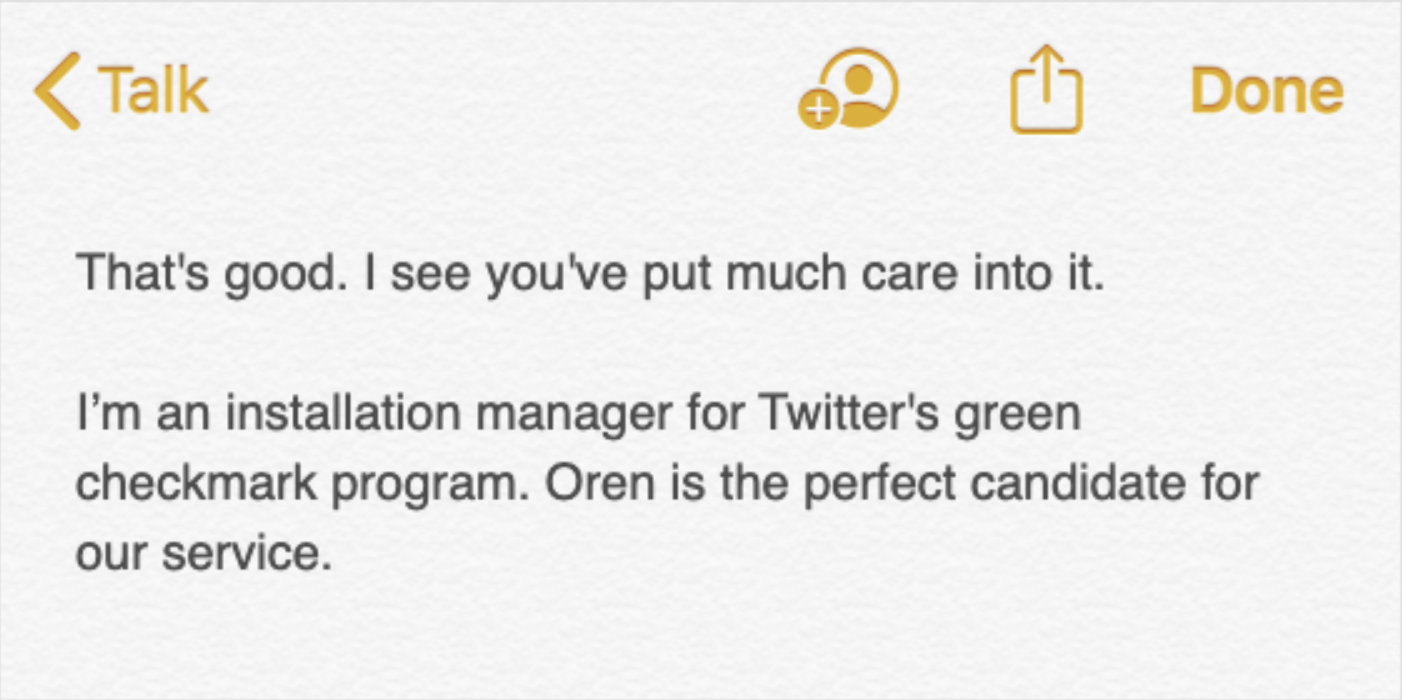
Zain cocked his head. “I told you I’m not interested. I don’t want anyone rooting around here, especially not the delicate beams and rafters.”
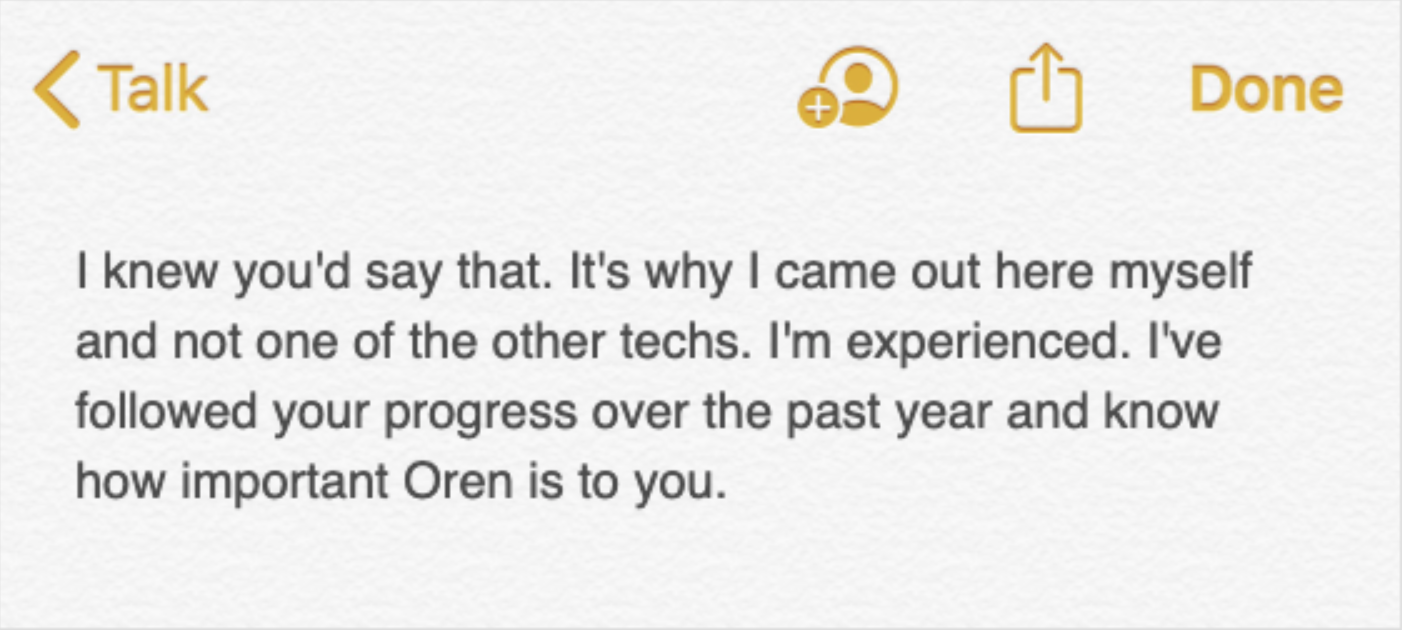
“I’m sorry. I’m not interested.”
It was jarring seeing her half of the conversation on the screen, her words immortalized. Would she delete this note? Or keep it for her own records?
She smiled and nodded.

There would be no harm in showing her. She was a visitor, after all. He led her up the creaking spiral stairs. They stood for a while at the south-facing window, gazing out at the late afternoon haze that enveloped the ocean.

“Yep. Been dark for a while.”
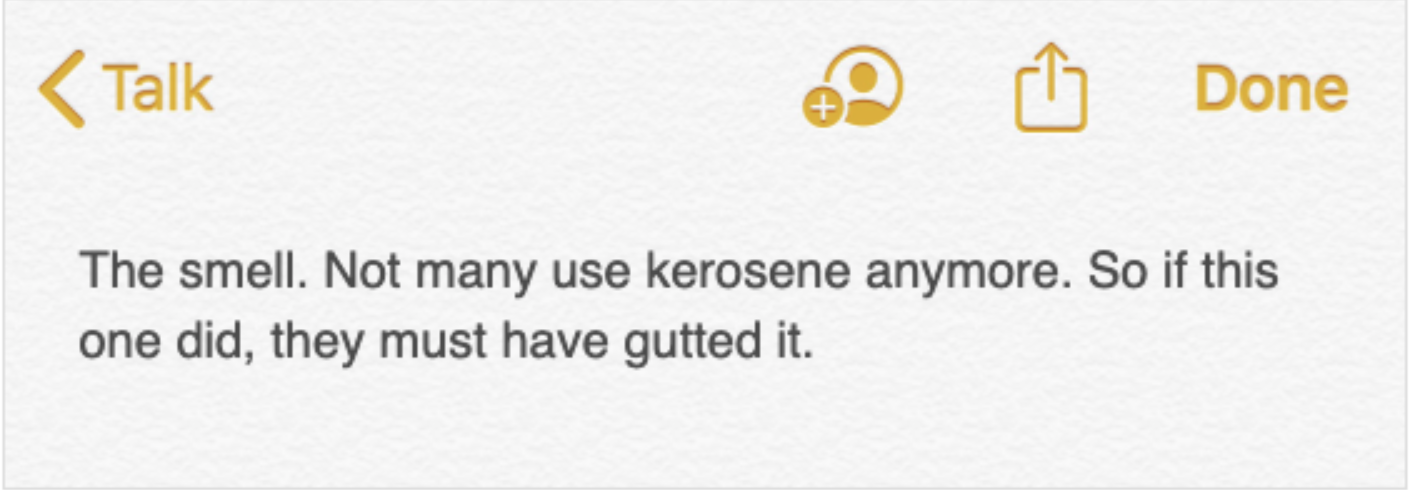
“My uncle decided to douse the light before they forced him. My mom said he didn’t like other people telling him what to do, but he just didn’t like people. Period.”
Zain tailored the tours for each visitor, changing it to suit their tastes: lengthy monologues for history buffs, cheeky stories for families, and personal tales for those seeking a deeper connection. But he got the sense that she wanted to simply be still in this place. “Do you always speak through your phone?”
She stared at him with oil-dark eyes.
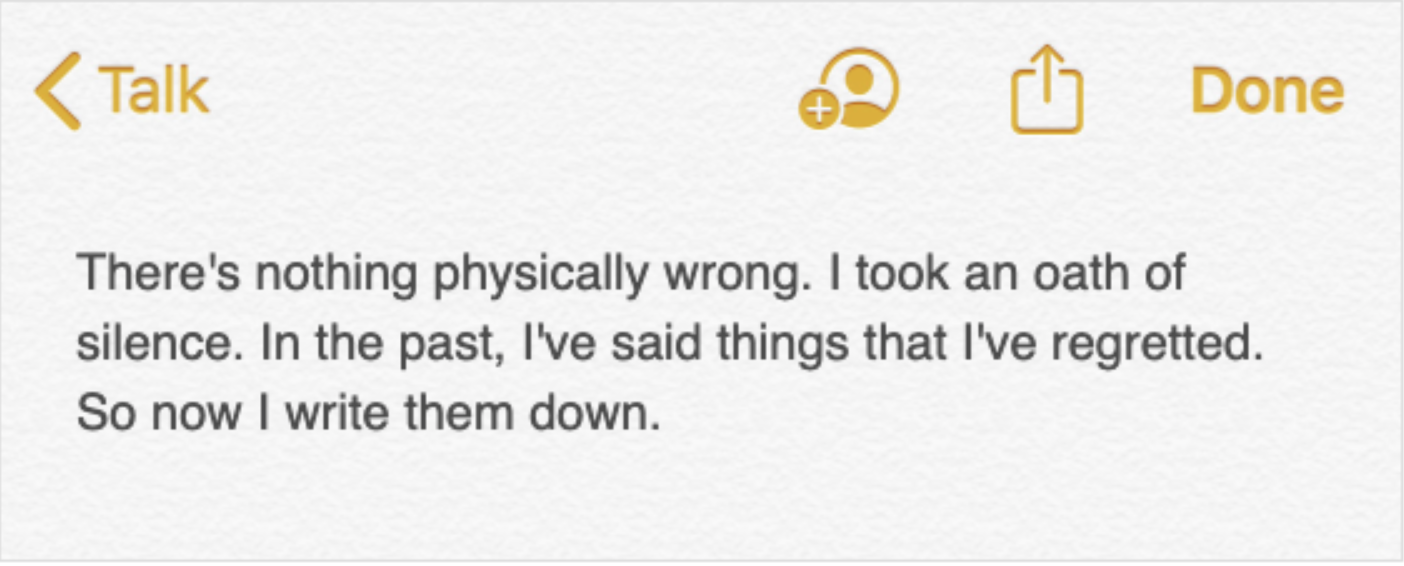
She walked over to the wall and gestured for him to follow.
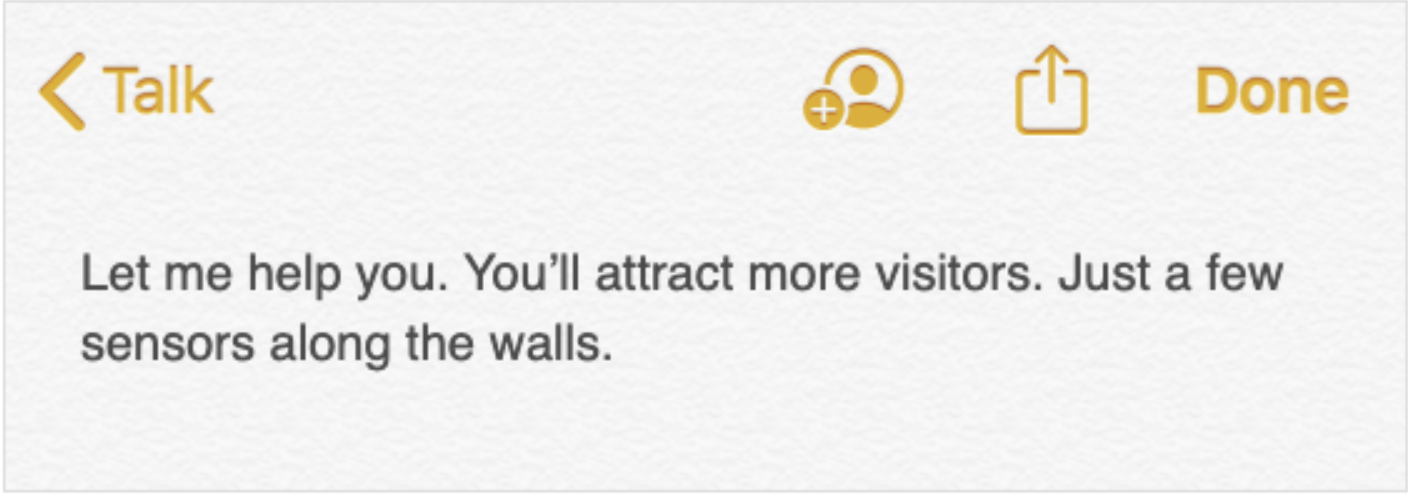
Before he could answer, she reached into her carrying case and pulled something out, palming it against the wall. “Wait, stop,” he said. When she pulled her hand away, there was nothing there. She pointed at the plaster. Upon closer inspection, he saw a faint outline — a circular chameleon of a device.
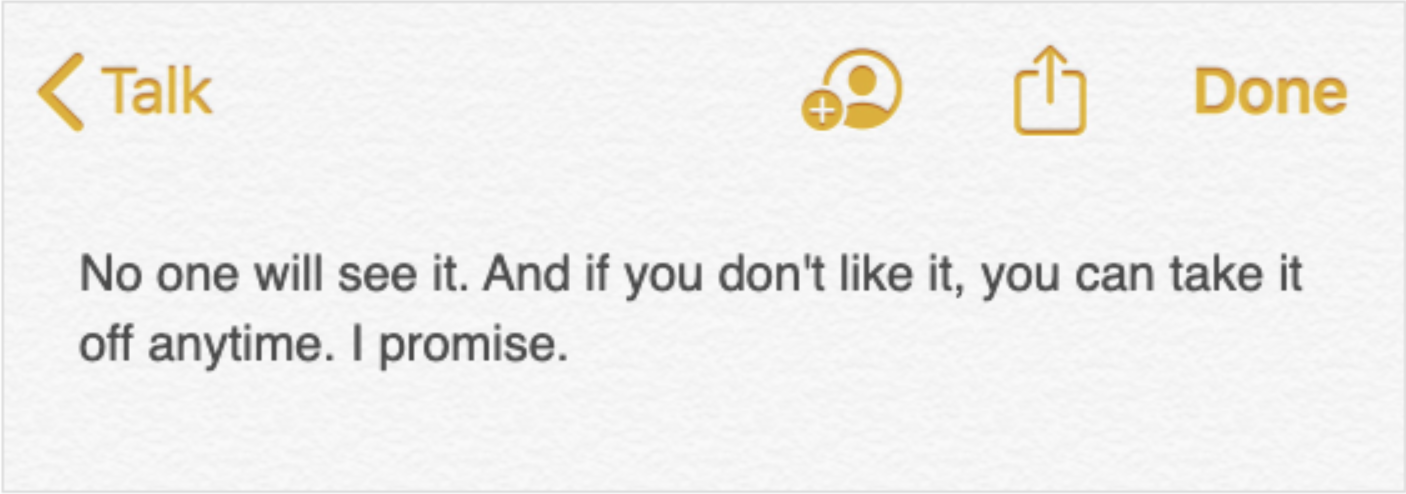
If the footprint were this small, perhaps it would be alright. He admitted that the checkmark would be good for promotion. He left her to attend to another guest that arrived. By the time he went back upstairs, she had vanished.
He realized he never asked for her name.

After being admitted to the green checkmark program, the light began composing its own tweets from time to time. The narrative was now a collaboration between Zain and Oren, their thoughts interleaved in public. The sensors dictated particular tweet templates: one reported temperatures, another the brightness of the sky, and another described the views from various vantage points the light afforded.



Other landmarks with green checkmarks followed him — a nearby village, a farmhouse that sold lingonberries in the summertime, a turnpike that tweeted traffic reports for daily commuters. And a pond nestled along a gravel road a mile away:





The cadence of the pond’s tweets captivated him. He began visiting the pond on weekends, hoping to catch a glimpse of its caretaker. But there were only elderly couples, young parents, and children carving spirals in the ice.
Holes pocked the surface of the pond, evidence of the caretaker’s measurements. Whoever it was, he wanted to meet them.
Zain liked to fry thick slabs of bacon on the wood stove for breakfast. One morning, as the meat splattered, a rapid knock came at the door. He found Lee standing there, holding a thick marble slab in his hand. The Filipino mailman had a well-worn face with stoic walnut features as if carved from wood.
“Ya gotta sign for this one,” Lee said. “I’ve seen a few of these in the mailroom lately. Is it a sample for a bathroom remodel?”
Zain wiped off the specks of dirt, revealing engraved letters on the surface. He pressed the marble into his palm. It was an invitation to a conference — a lavish event for green checkmarks like himself. It reminded him of those exclusive enterprise conferences that he was forced to attend as a young engineer, dragged by the sales people. He never felt so out of place.
“I can’t go,” he muttered.
“What was that, son?”
“I have to be here during the day. I can’t go to this. It’s an invitation.”
“I don’t know what this is, but I’d go if I were you. Someone made an effort to get this to you. Don’t be like me. Past my prime now. This old ticker seen better days. I never took the risks when the time was right.” He thumped his chest. “Doc says I gotta retire. You know what I told him? Retiring is the one thing that would kill me!”
“I need to keep watch here.”
“That’s what the last caretaker said before he started hearing voices. Mind plays tricks when you’re alone,” Lee said.
“My uncle hated people. That’s why he went crazy, not because he was alone,” Zain said.
“Oh, you’re related by blood.” He grunted, as if he knew all along. “Look — this light’s best days are behind it. You’re a young man. I don’t know what was going through your uncle’s head, but this talk of ‘watching the light’ was exactly what he said. Rest his soul.” Lee signed the cross across his chest. “You should expand your possibilities, young man.”
He grunted again, then waved goodbye as he pushed the rickety mail cart down the path back to the road.

Zain pressed the heavy marble into his hand, letting the raised lettering imprint onto his skin:
Object Permanence — The Conference for Landmarks.
Maybe Lee was right. The light wouldn’t miss him for one day, would it?
Even though Boston was only a few hours away, it had been years since he’d ventured to the city. With each passing train stop, a sense of unease welled up inside of him. The light pleaded with him to go back. “Only one day,” he whispered.
At the conference center, he passed his invitation to a lanky man with thick-rimmed glasses. He scanned it, then disappeared below the registration desk, emerging with another slab — a black velvet rock streaked with white veins and engraved with his information.
“This is your badge, Oren Point,” the man said.
“My name is Zain.”
The man put up a hand. “In here, your name is Oren Point.”
Zain glanced at the man’s badge. “Seaport World Trade Center. You’re this building.”
Seaport World Trade Center gave a wry smile. “Please, no jokes about being inside me.”
“I wouldn’t do that. But you must have a lot of stories from the conferences.”
“It’s just a job. Next in line, please.”

The main floor was festooned with 3D models of buildings and landmarks — the Eiffel Tower, the Pyramids of Giza, the Taj Mahal — each rendered with such loving detail that he wouldn’t have been surprised if they were hand-carved. Attendees threaded between the rows with drinks in hand. The chatter was overwhelming. It was so loud he couldn’t think. He’d hoped that the heavy badge would act like a shield, emboldening him to make connections. But instead, it was an anchor pinning him to the seafloor. Maybe this was a waste of time.
There was a tap on his shoulder. “Lighthouse? Come, come. I’m getting to the best part of the story.”
Zain peered at the man’s badge: Coit Tower. San Francisco. 130k followers.
A group huddled around him. “I claimed my handle first before the San Francisco officials could. But I still have to include this damn ‘unofficial’ mark in my bio. The ‘U’ word. Can you believe it? Tried fighting it in court, but no luck. Fuck the bureaucrats.”
A short woman with sunglasses perched in her hair leaned in. “Coit Tower, I’ve followed you for so long.”
“Call me Coit.”
She clasped her hands together. “Sorry, I’m a little nervous. I loved that tweet about the wildfire smoke engulfing the city. And that panoramic photo. How did you get it?”
“Scaled the tower.”
“And the post about the families perching on you to get fresh air. It was beautiful. Oh, I’m sorry, I’m so rude. I haven’t introduced myself.” She lifted her badge over her head for all to see. “Damlandermolen. I’m a windmill in the Netherlands. You have to schedule a time to visit me. No, I don’t really grind wheat. It’s just a show for the tourists. Oh…. I’m rambling now. Just can’t hold anything in. Probably why I post too much. But my fans love it.”
“You came all the way from Holland?” Zain asked.
“Nope. Boston-bred,” she chirped.
“You don’t live there?” Coit Tower said, shaking his head. “You need to be at the windmill to know what it’s like.”
“I’ve visited before. And installed the sensors—”
“That’s not enough.”
“I like windmills,” Damlandermolen said with a beaming smile. “That’s enough.”
Someone slapped Coit on the back. “Hello, my old boy,” the imposing man bellowed. He wore a San Francisco sweatshirt and was smacking gum in his mouth.
“Hi, Gold,” Coit said.
“I hope this guy isn’t boring you.”
Zain read the man’s badge and drew in a sharp breath. In person, he didn’t look so iconic.
“Are you the Golden Gate Bridge?” Dam said.
“At your service.” He bowed, then blew a bubble, letting it pop across his upper lip. His tongue emerged like a hungry snake, grabbing the bright, deflated gum and snapping it back into its dark cave. “Hey Coit, you still buying those sponsored tweets? You really should stop. Cheapens your brand.”
“Don’t tell me what to do,” Coit Tower said.
Golden Gate chuckled. “Did you check the latest from Eiffel? Honest to god, he thinks people like him!” He pointed at Zain. “Lighthouse — here’s a question: do your fans like you?”
Zain cleared his throat. “I have visitors once a while. Nothing compared to you, of course. But I’d like to think that—”
“Trick question, buddy. Of course your fans like you. The real question is: do they love you?”
“Well, I give them a good tour and explain the history of my place.”
Golden Gate lowered his voice. “Here’s the truth: no one likes Eiffel. He’s an abstraction — a figment of the mind. People love the idea of him. Sure, he’s on all the must-visit lists. But people just snap a photo and move on. They don’t even look at him.”
“You’re no different,” Coit snapped.
“Proof is in the feed.”


Coit Tower pulled Zain aside. “Don’t listen to him.”
A twinge of fear coursed through his veins: What if visitors were walking up to the lighthouse right now? All of this talk about growing his followers was pointless if he was neglecting his duties.
He grabbed a bottle of water from the concession stand and drained it in one gulp. He hadn’t realized how dehydrated he was. The room seemed to darken and the attendees transformed into silhouettes of dilapidated buildings — a crumbling city in sinister twilight. Zain felt like he had stumbled into the wrong party, surrounded by people who didn’t speak his language. There was one person that he hoped might be here, but he hadn’t seen them. He took out his phone and opened the Twitter app:

Eiffel Tower strutted the gleaming keynote stage in a tailored suit and a tie dotted with mini-Eiffels. He was a portly man, perpetually out of breath, with sweat beaded on his forehead. Zain squirmed in the tight seat, sandwiched between Mill Ends Park (The Smallest Park in the USA) and Stonehenge. From the smell, he knew that neither man had showered in days. Both were engulfed into their phones, their eyes never looking up.
Eiffel Tower’s voice boomed on the stage, cameras projecting his visage on gigantic screens across the auditorium. “You need to elevate your structure! It is you that your clients dream of visiting. Remember: clients, not tourists or visitors. You are a luxury — not digital bits, but a solid object in the world. You are meant to be revered. Some of you may even last forever.” He struck a power pose with his hands on his hips. “Everyone can be the Eiffel Tower of their own town.”

There was rampant applause. The man’s voice and swagger told him everything he needed to know: that the landmark was a preacher that believed his own false gospel. Zain felt a wave of nausea, and before he knew what was happening, his legs had walked his body out of the packed room.
“How are you raising your foot traffic? You. Yes, you,” said the vendor. A sign behind him blared: “BECOMING THE NEXT HOT DESTINATION.”
Zain shook his head.
The man chuckled. “If you’re not growing your audience, you’re dead.”
Acid welled up in Zain’s stomach. “I don’t want to be the best,” he said. “I want people to appreciate my lighthouse for what it is. If they don’t, that’s okay.”
The man’s smile faded. “Access your inner David Ogilvy, and see yourself as the ultimate destination in your area. Hey, I think I know where you’re located. Near Boston, right? It’s off the interstate. I used to go there….”
Zain walked away, making a zigzag line toward the exit. But he couldn’t bring himself to leave. He’d promised himself that he’d give this a chance.
“Hey, lighthouse!”
It was Damlandermolen, jumping with excitement. She held up her phone. “You’re famous. No — we’re famous!”
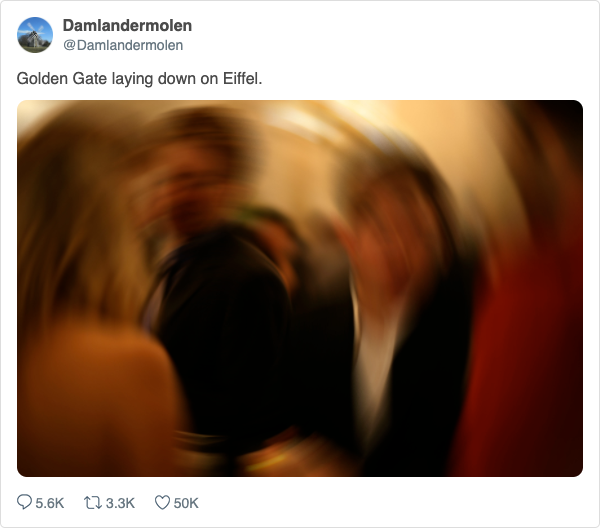
“You shouldn’t have posted that.”
“This is what Eiffel was talking about — putting yourself out there for who you are.”
Zain sighed. “What does this have to do with windmills?”
“I mentioned you in the tweet.” Dam smiled. “You should thank me.”
Notifications flooded his phone. Digital anger flickered from the screen.
A commotion near the concession stands jolted everyone around him. A crowd had gathered in a circle. Zain and Dam pushed through to the front. He gasped—
—Eiffel was straddling Golden Gate Bridge, the keynote speaker’s stubby fingers wrapped around the bridge’s neck. The bridge’s face had turned a morose shade of plum.
“Everyone stay back,” Eiffel said. The other landmarks were pointing their phones at the altercation. Dam was narrating a live stream.
“Get off of him,” Zain yelled. Eiffel didn’t hear him. His eyes were in a trance. Zain tried to pry Eiffel off the bridge, but the tower was stronger than he appeared.
“Why are you even fighting?” Zain said.
“I don’t have to explain anything,” Eiffel stuttered. The tower’s hair glistened with sweat, and his eyes had turned a dull color. “This imposter is banned. He’s not allowed here in my conference, eating my food.”
“This is happening live, folks!” Dam screamed into her phone.
Heavy footsteps approached from across the hall. Hopefully it was security. They’d clear this up. Eiffel rolled off the bridge, out of breath. He looked like he was going to have a heart attack.
“Any comments, Golden Gate?” Dam thrust the phone in his face. Golden Gate sat up, his face pale and motionless. He didn’t answer. No one in crowd moved — they were entranced, looking at their phones, recording the moment. For what sick purpose, Zain had no idea.
“He’s choking,” a voice yelled. It came from a woman in a gray hoodie. She knelt down and slapped Golden Gate on the back. There was a horrible retching sound. The gum dislodged in a puddle of spittle on the carpet. She knelt down and thrust a phone into Zain’s face. Her dark eyes met his. Words written in the notes app.
He stood and yelled her message: “Move along! Don’t you have anything better to do?”
He found her drinking iced coffee at a corner table. She was shaking — from anger or adrenaline, he wasn’t sure. She managed a weak smile, studying the crevices in her paper cup in that same methodical manner as she had with the light that time she visited.
Her marble tag read: @NabassatPond / Twitter Representative.
“You’re the pond’s caretaker?” She was there all along, skating on the ice, alone, just like him, occluded by the other families. “Why didn’t you tell me?”
“I didn’t want anyone to know,” she said. It was the first time Zain heard her voice. It had a sing-songy nature to it, what he imagined a robin would sound like if it could speak. “When I visited the pond, it was overgrown with algae and moss. People tossed trash bags and broken appliances into it… even a shopping cart. It was horrible.” Nabassat palmed her face. “I used to lose my temper. I said things I regretted. To the people I love. To my family. My friends. My ex.”
“We all do that. Do things we regret,” Zain said. “Like coming to this conference.”
“I’m glad you’re here,” she said. A smile broadened over her face. “The spruce and chestnut trees that surrounded the pond were so inviting and familiar. That’s when I realized I’d been to that pond before. When I was a girl. Our family picnicked there on a road trip. I never took to those long car rides. That pond was a pristine hideaway. I wanted to return it to the way it was and share it with others. But I only wanted to do it if I were anonymous. Even if you’re improving something, people will find reasons to hate you,” she said.
“I’m most alive when tweeting as the light—”
“—and not as yourself,” she said.
By now, the crowd had dispersed. Security officers were questioning Eiffel Tower, who sat in a stupor on the carpeted floor. Next to him, medics attended to Golden Gate. Dam was nowhere to be seen — the windmill had probably moved on to the next shiny event to live stream.
“You saved that man’s life back there,” Zain said.
“I did what any decent person should do.” She paused, taking in a deep breath. “Seven inches. Our pond is safe enough for anyone to skate on,” Nabassat said.
“Weather’s clear on the coast,” Zain said. “A light breeze hitting my lantern.”
“A few people have strung lights across my trees. You should come visit,” she said. She took her phone, and her eyes widened.
“What?” Zain said.

“Did you tweet that?”
Zain shook his head.
“Then it must be the sensors. Maybe the light is back.”
“That’s not possible,” Zain said. “The lantern was gutted long ago.”
“The sensors don’t lie. Maybe it’s found a way,” she said.
Zain felt a warmth spread upwards from his neck, as if a flame flickered inside his head, licking the back of his eyes and casting a glow on his innermost cavity. “I have to get back. Do you want to come?” he asked.
“I’d love to.”
They left their belongings on the table — the conference tote and their heavy badges. They walked past the landmarks and drove together down the interstate.
“Before we go to the light, there’s one thing I’d love to do, if you’re up for it,” she said.
Of course he would.
They took an early exit. They could spare time to skate on Nabassat Pond. There was no rush. The light and the pond taking in a quiet evening. And maybe they would tweet a photo of that moment, so that others could see it too.
